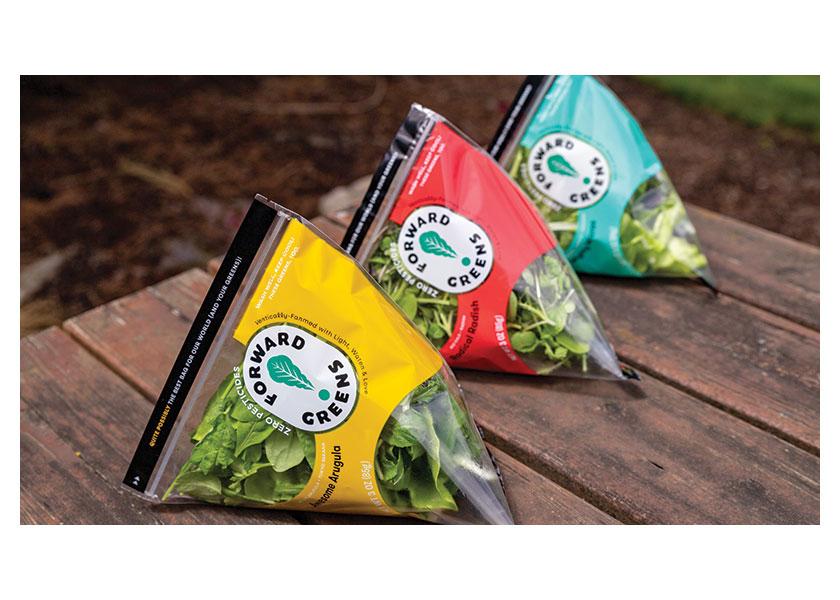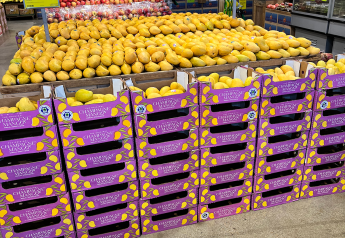Biodegradable or recyclable? Marketers weigh options

Whether packaging materials have one life or several, produce packers and shippers say they have to have a plan for them.
“With increased awareness about the effects of single-use plastic on the planet, biodegradable/compostable plastic is being looked into by many shipper-growers in the produce packing world,” said Chuck Sinks, president of sales and marketing with Yakima, Wash.-based Sage Fruit Co.
On clamshells and pouch bags for apples, cherries and pears, these newest materials are plant-based alternatives, which are both strong and are meant to solve water-resistance and other issues but are made from natural — and mostly biodegradable — materials, Sinks said.
“The best option, as far as eco-friendly packaging practices, would always be paper over plastic when available, as paper is better because it’s renewable and naturally biodegradable,” Sinks said.
“Sage Fruit has gone to a completely paper tote bag for apples and pears, which is an FDA compliant paper product and is certified to be completely recyclable and compostable.”
Package makers are aware of the hurdles involved in supplying biodegradable materials, said Jeff Watkin, graphic and marketing manager with Collinsville, Ill.-based packaging manufacturer Sev-Rend Corp.
“We see the biodegradable process as an ideal approach to single use plastics and the technology is catching up with the market,” he said.
Watkin noted that a product must break down within a six-month window to qualify as biodegradable. He also noted that Sev-Rend has a new product Bio-Able product line that it sees as an ideal option to this process.
Bio-Able enables the packaging to break down with “bio-assimilation” technology, Watkin said.
“Sev-Rend’s Bio-Able Solutions products are 100% recyclable and uniquely formulated to fully degrade in both marine and terrestrial environments, leaving behind no micro-plastic waste without needing the ideal environment,” he said.
Watkin noted that the process technically is not “biodegradable,” but Sev-Rend sees it as “an even better option, due to the breakdown nature of the product.”
Read more: Sev-Rend highlights Bio-Able Solutions
Biodegradable products are not currently recyclable and can contaminate the recycling process when placed into a standard recycling bin, said Cindy Blish, associate brand and communications manager at Shelton, Conn.-based Inline Plastics Corp.
“Biodegradable products will only decompose if sent to special processing facilities, which are rare,” she said. “As most food packaging is used at the consumer level, consumers would be at a loss to find the means to that end.”
PET remains the most common recycled plastic and the most expeditious means to reduce waste, Blish said.
“We continue looking at biodegradable packaging options but have not found a material that is as functional or cost-effective as rPET yet,” said Bruce Knobeloch, vice president of marketing and product development for Watsonville, Calif.-based Monterey Mushrooms Inc.
Some produce distributors have investigated alternative bag materials to deal with biodegradability issues.
“Forward Greens decided to switch from using biodegradable clamshells to our current bags after we discovered that the materials are not accepted by public municipalities,” said Ken Kaneko, founder and CEO at Vancouver, Wash.-based Forward Greens.
“We will likely continue to reevaluate this option as more information is available with respect to municipalities and packaging specifications that are relevant to product freshness.”
Some recently developed biopolymers “have real potential” in terms of biodegradability, said Jeffrey Brandenburg, CEO of the Greenfield, Mass.-based JSB Group LLC, which has QFresh Lab, a packaging research center in Salinas, Calif.
“These are being evaluated for rigid and flexible formats,” Brandenburg said.
Rigid is a more difficult package format because of the “strength properties” required, Brandenburg said.
One of the challenges with biopolymers is disposal, since they typically cannot get recycled, he said.
“If the consumer does not have access to either industrial or home composting and they discard in the trash, which ends up in a landfill, then it is not clear if they will degrade,” he said. “Consumers and officials need to be educated as to how best to use and dispose of some of these technologies.”
To date, compostable and recyclable packaging comprised mostly of fiber and paperboard trays has not delivered on sustainability promises, said Cem Yildirim, national sales manager for produce for Kansas City, Mo.-based Multivac Inc.
Packaging news and inromation.
“This is primarily due to the limited availability of heat-sealable trays and the material costs being prohibitively high, preventing widespread adoption,” Yildirim said.
Consumers can take an active role in the process, said Sara Lozano, marketing and product development with Watsonville-based Sambrailo Packaging.
“Compostable has more weight than the term biodegradable,” Lozano said.
“Biodegradable materials and timelines range, depending on environment and conditions. Composting is a process and discipline that can be done at the home level and on an industrial scale (facility available within your municipality dependent).”







